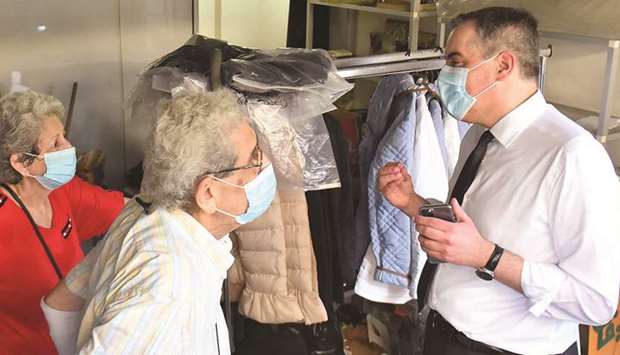Lebanon’s leaders yesterday designated a new prime minister, diplomat Mustapha Adib, to tackle the country’s deep political and economic crisis, hours before French President Emmanuel Macron was due to visit. Mustapha Adib, 48, Lebanon’s former envoy to Germany, gave a televised speech acknowledging the “need to form a government in record time and to begin implementing reforms immediately”.
He vowed to resume talks with the International Monetary Fund for assistance as Lebanon faces its worst economic crisis since the 1975-1990 civil war and was traumatised by Beirut’s deadly August 4 explosion. “I want your trust,” an AFP correspondent heard him tell a resident of Beirut’s badly-hit Gemmayzeh neighbourhood during a tour of the area devastated by the massive blast which rocked the city and further shook confidence in the political class.
Macron, who had toured the area two days after the disaster, was due to return later Tuesday and was expected to renew his calls for a radical overhaul of the country’s complex, sectarian political system.
Macron had demanded “deep change” and warned then he would check on progress when he returned for the September 1 centenary of Greater Lebanon, expected to be a glum commemoration. On the eve of the event, many citizens were planning to leave the country and asked whether Lebanon would live to be 101.
President Michel Aoun and his political ally, Hezbollah leader Hassan Nasrallah, on Sunday both expressed willingness to change the way Lebanon is governed.
Adib emerged as a consensus option Sunday and was named premier the next day in a statement by the presidency.
The close aide to former prime minister Najib Mikati received backing from the country’s top political parties.
Lebanon’s last government, headed by Hassan Diab, resigned after the massive explosion, which revived calls at home and abroad for radical revamp of the state.
The blast, one of the largest non-nuclear explosions in history, killed at least 188 people, wounded thousands, laid waste to large parts of the capital and compounded Lebanon’s economic woes.
It caused up to $4.6bn worth of physical damage and a blow to economic activity of up to $3.5bn, according to a World Bank assessment.
Caused by a vast stockpile of ammonium nitrate that had languished at Beirut’s port for years until it was ignited by a nearby fire.

Lebanon’s newly-appointed Prime Minister Mustapha Adib (right) speaks with the owners of a damaged shop during a tour in Beirut’s badly-hit Gemmayzeh neighbourhood, yesterday.
